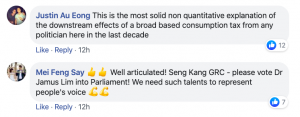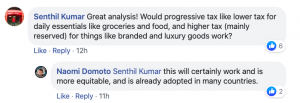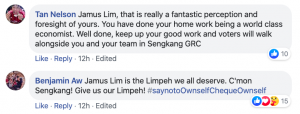Singapore—Economist Jamus Lim, one of the rising stars of the opposition Workers’ Party (WP) in this General Election, has further drawn the distinction between the People’s Action Party (PAP) and the WP in terms of the intended GST hike.
And while Foreign Affairs Minister Dr Vivian Balaksrishnan has pointed out that parts of the manifesto of the WP are so similar to those of the People’s Action Party (PAP) that people have taken to calling the WP ‘PAP Lite’, Professor Lim said on July 2, “Where we fundamentally differ is where we think those trade-offs should occur. PAP tends to be on the side of Capital. A rebalance of the share of labour income is ultimately necessary.”
Now, for those of us who are not economists, Professor Lim broke down his statement further in a Facebook post on July 3, wherein he wrote about the WP’s opposition to the goods and services tax (GST) hike of seven to nine percent, which is scheduled to take effect between 2022 and 2025.
One of the main policy positions the #workersparty is advancing this #ge2020sg is an objection to a GST hike, of 7 to 9…
Posted by Jamus Lim on Friday, July 3, 2020
The candidate’s post had been shared over 600 times and he has been getting much praise from netizens, with some even calling him Singapore’s next Finance Minister. He explained in the post that objecting to the GST hike is one of WP’s main policy positions, calling the hike an error both in the short and long term.
For the near future, the GST hike would prove to be to Singapore’s disadvantage should the recession be a prolonged one, he explained, citing the example of Japan, “which has remained in a low-growth regime, and often fell into recession each time it either attempted to (or actually did) increase its consumption tax, ever since 1997. Consumption tax hikes may have well prolonged its lost decade(s).”
And while Professor Lim acknowledged that the Government indicated they understood this by announcing that the GST would not increase in 2021, because it will still go on as planned in the years after “can dampen expectations and weaken the stimulus effects of current fiscal expenditures.” This would also urge consumers toward greater saving instead of spending, which would also have negative effects on the economy.
As for the long-term effects, Professor Lim wrote, “the proposal has pernicious long-run consequences, too. When potential output of the economy is low (perhaps due to demographic factors), a small policy shock can have disproportionate effects on growth.”
Another concern he highlighted is the effect on the country’s already present problem of inequality. Since “income distribution is already skewed in capital’s favor,” he wrote, taxes that further burden consumers would only make the problem of inequality worse.
The WP candidate proposed alternative solutions to the GST hike, which is meant to help buffer the Government’s spading needs.
“One is to slow the rate of reserve accumulation by raising the net interest returns contribution to 60 from the current 50 percent (this does not eat into principal and isn’t imprudent). Another way is to channel a fraction of land sales receipts (which currently go toward reserves) toward meeting recurrent expenditures like health and education. The common govt argument that land represents assets ignores the fact that human capital is an asset, too.”
Professor Lim explained that this is why he says the PAP is biased toward capital (physical or land), instead of labor and human capital, ending his piece by writing, “By voting the #workersparty, you can help redress this imbalance, among the most severe in rich economies, and return more power to the worker #makeyourvotecount“
Netizens are showering the WP candidate with a lot of love.









-/TISG
Read also: WP = PAP Lite? Dr Balakrishnan paid opposition party an “unintended compliment”
WP = PAP Lite? Dr Balakrishnan paid opposition party an “unintended compliment”

